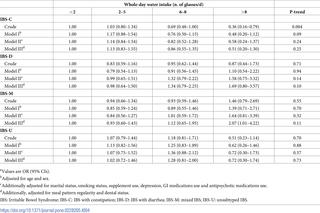Our official English website, www.x-mol.net, welcomes your
feedback! (Note: you will need to create a separate account there.)
Water consumption and prevalence of irritable bowel syndrome among adults.
PLOS ONE ( IF 2.9 ) Pub Date : 2020-01-24 , DOI: 10.1371/journal.pone.0228205 Asma Salari-Moghaddam 1, 2 , Ammar Hassanzadeh Keshteli 3, 4 , Ahmad Esmaillzadeh 2, 5, 6 , Peyman Adibi 4
PLOS ONE ( IF 2.9 ) Pub Date : 2020-01-24 , DOI: 10.1371/journal.pone.0228205 Asma Salari-Moghaddam 1, 2 , Ammar Hassanzadeh Keshteli 3, 4 , Ahmad Esmaillzadeh 2, 5, 6 , Peyman Adibi 4
Affiliation

|
BACKGROUND AND AIM
No previous study examined the association between whole-day water intake and odds of irritable bowel syndrome (IBS). We examined the association between whole-day water intake and odds of IBS in a large sample of Iranian adults.
METHODS
This cross-sectional study was conducted among 4763 adults in Isfahan, Iran. Daily water intake was assessed using a pre-tested questionnaire by asking questions about the average number of glasses of water consumed in a day. IBS was assessed and defined using a modified Persian version of Rome III questionnaire.
RESULTS
After taking potential confounders into account, no significant association between water consumption and odds of IBS was seen (OR: 1.14; 95% CI: 0.74-1.78). We observed that participants who were taking >8 glasses/d of water had greater odds of IBS-M in comparison to those who consumed <2 glasses daily (OR: 2.07; 95% CI: 1.01-4.22). No significant association was observed between water intake and odds of IBS in either gender as well [for men: OR: 1.15; 95% CI: 0.59-2.24 and for women: OR: 1.15; 95% CI: 0.62-2.12]. By BMI status, no significant association was observed between whole day water intake and odds of IBS among normal weight (BMI<25 kg/m2) or overweight and obese people (BMI≥25 kg/m2).
CONCLUSION
We found that whole-day water intake was not associated with odds of IBS. A significant association between consumption of >8 glasses of water per day and odds of IBS-M was observed.
中文翻译:

成人的耗水量和肠易激综合症患病率。
背景与目的以前没有研究检查全天摄入水量与肠易激综合症(IBS)几率之间的关系。我们在大量伊朗成年人中研究了全天取水量与IBS几率之间的关系。方法这项横断面研究是在伊朗伊斯法罕市的4763名成年人中进行的。使用预先测试的问卷,通过询问有关一天中平均喝水的平均杯数的问题来评估每日的饮水量。使用修改后的波斯文罗马III问卷对IBS进行评估和定义。结果在考虑了潜在的混杂因素之后,水消耗与IBS的几率之间没有显着相关性(OR:1.14; 95%CI:0.74-1.78)。我们观察到参加者> 与每天喝少于2杯的水相比,每天喝8杯水的IBS-M几率更高(或:2.07; 95%CI:1.01-4.22)。男女之间水摄入量与IBS几率之间也没有显着相关性[男性:OR:1.15;95%CI:0.59-2.24;女性:OR:1.15;95%CI:0.62-2.12]。根据BMI状况,在正常体重(BMI <25 kg / m2)或超重和肥胖人群(BMI≥25kg / m2)中,全天饮水与IBS几率之间没有显着关联。结论我们发现全天饮水与IBS几率无关。每天摄入> 8杯水与IBS-M几率之间存在显着关联。男女之间水摄入量与IBS几率之间也没有显着相关性[男性:OR:1.15;95%CI:0.59-2.24;女性:OR:1.15;95%CI:0.62-2.12]。根据BMI状态,在正常体重(BMI <25 kg / m2)或超重和肥胖人群(BMI≥25kg / m2)中,全天摄水量与IBS几率之间没有显着相关性。结论我们发现全天饮水与IBS几率无关。每天摄入> 8杯水与IBS-M几率之间存在显着关联。男女之间水摄入量与IBS几率之间也没有显着相关性[男性:OR:1.15;95%CI:0.59-2.24;女性:OR:1.15;95%CI:0.62-2.12]。根据BMI状态,在正常体重(BMI <25 kg / m2)或超重和肥胖人群(BMI≥25kg / m2)中,全天摄水量与IBS几率之间没有显着相关性。结论我们发现全天饮水与IBS几率无关。每天摄入> 8杯水与IBS-M几率之间存在显着关联。结论我们发现全天饮水与IBS几率无关。每天摄入> 8杯水与IBS-M几率之间存在显着关联。结论我们发现全天饮水与IBS几率无关。每天摄入> 8杯水与IBS-M几率之间存在显着关联。
更新日期:2020-01-26
中文翻译:

成人的耗水量和肠易激综合症患病率。
背景与目的以前没有研究检查全天摄入水量与肠易激综合症(IBS)几率之间的关系。我们在大量伊朗成年人中研究了全天取水量与IBS几率之间的关系。方法这项横断面研究是在伊朗伊斯法罕市的4763名成年人中进行的。使用预先测试的问卷,通过询问有关一天中平均喝水的平均杯数的问题来评估每日的饮水量。使用修改后的波斯文罗马III问卷对IBS进行评估和定义。结果在考虑了潜在的混杂因素之后,水消耗与IBS的几率之间没有显着相关性(OR:1.14; 95%CI:0.74-1.78)。我们观察到参加者> 与每天喝少于2杯的水相比,每天喝8杯水的IBS-M几率更高(或:2.07; 95%CI:1.01-4.22)。男女之间水摄入量与IBS几率之间也没有显着相关性[男性:OR:1.15;95%CI:0.59-2.24;女性:OR:1.15;95%CI:0.62-2.12]。根据BMI状况,在正常体重(BMI <25 kg / m2)或超重和肥胖人群(BMI≥25kg / m2)中,全天饮水与IBS几率之间没有显着关联。结论我们发现全天饮水与IBS几率无关。每天摄入> 8杯水与IBS-M几率之间存在显着关联。男女之间水摄入量与IBS几率之间也没有显着相关性[男性:OR:1.15;95%CI:0.59-2.24;女性:OR:1.15;95%CI:0.62-2.12]。根据BMI状态,在正常体重(BMI <25 kg / m2)或超重和肥胖人群(BMI≥25kg / m2)中,全天摄水量与IBS几率之间没有显着相关性。结论我们发现全天饮水与IBS几率无关。每天摄入> 8杯水与IBS-M几率之间存在显着关联。男女之间水摄入量与IBS几率之间也没有显着相关性[男性:OR:1.15;95%CI:0.59-2.24;女性:OR:1.15;95%CI:0.62-2.12]。根据BMI状态,在正常体重(BMI <25 kg / m2)或超重和肥胖人群(BMI≥25kg / m2)中,全天摄水量与IBS几率之间没有显着相关性。结论我们发现全天饮水与IBS几率无关。每天摄入> 8杯水与IBS-M几率之间存在显着关联。结论我们发现全天饮水与IBS几率无关。每天摄入> 8杯水与IBS-M几率之间存在显着关联。结论我们发现全天饮水与IBS几率无关。每天摄入> 8杯水与IBS-M几率之间存在显着关联。









































 京公网安备 11010802027423号
京公网安备 11010802027423号